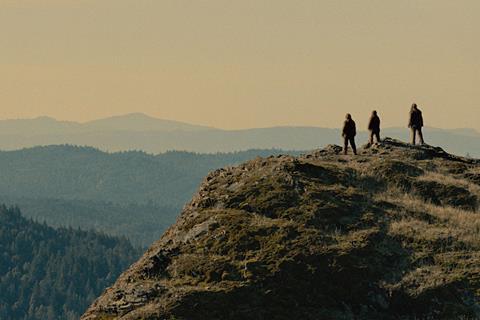An unrecognisable Riley Keough and Jesse Eisenberg impress in this dialogue-free Bigfoot drama

Dirs: David Zellner and Nathan Zellner. US. 2023. 89mins
Writer-directors David Zellner and Nathan Zellner’s fifth feature is easily their finest, a portrait of a Bigfoot community that starts out as an absurdist comedy before slowly transforming into a moving study of survival and loss.
A moving study of survival and loss
Sasquatch Sunset walks a delicate tonal tightrope. Riley Keough and Jesse Eisenberg are unrecognisable under extensive makeup as the mythical forest creatures. But that is not the only way in which this risky film raises the stakes: by incorporating no dialogue beyond grunts and wails it tries to work on a visceral level, delivering insights into our primal nature.
Like the brothers’ four previous features, including Damsel, Kumiko and The Treasure Hunter, Sasquatch Sunset makes its debut at Sundance. Bleecker Street will be releasing this affecting drama in the US, and good reviews could lead to a modest theatrical return. Keough and Eisenberg are indie royalty but because they are dressed as Bigfoots, part of the appeal for audiences will be seeing them deliver performances that, without hyperbole, are nothing like they have ever attempted before.
Somewhere deep in the American forest, four Sasquatch live together, scrounging for food and existing in harmony with nature. The characters are not given names, but Keough is the one female in the group, with Eisenberg her mate. (Christophe Zajac-Denek plays a beta-male Bigfoot, while Nathan Zellner portrays the quartet’s most aggressive member.) Told over four seasons, Sasquatch Sunset observes as the creatures face interpersonal challenges, as well as threats from predators — including humanity.
Among those most deserving of praise, Steve Newburn should be singled out for his remarkable creature design. Other films have sought to portray Sasquatches, from Harry And The Hendersons to Letters From The Big Man, but Sasquatch Sunset presents us with creatures that we instantly believe. (The illusion is enhanced by Michael Gioulakis’ cinematography, which captures the ethereal fog and brilliant sunlight that drape the forests of Northern California.) Other than the actors’ expressive eyes, the cast are buried underneath prosthetics and the performances are animalistic.
Initially, the sight of these Bigfoots may prompt laughter, especially after some early scenes involving the characters exhibiting human-like behaviour. But in short order, Sasquatch Sunset, which is written by David Zellner, starts to sketch out the power dynamics, daily rituals and lingering tensions amongst this seemingly close-knit group.
The bond shared by the couple played by Keough and Eisenberg spurs resentment in Nathan Zellner’s macho Bigfoot, setting the stage for a showdown with drastic repercussions. Jokes about the creatures consuming the wrong kind of mushroom or feverishly masterbating eventually give way to the harsh realities of the wild, with death soon becoming a regular occurrence in the narrative.
The Zellners, who edited the picture with Daniel Tarr, constantly keep the viewer clued in, even though the Bigfoots only speak in guttural tones. (There are no cutesy subtitles included.) But that adherence to ‘realism’ is indicative of the picture’s serious intentions, immersing us in their environment so that their encounters with dangerous animals like mountain lions feel appreciably fraught. (The filmmakers used real animals for the shoot.)
The Bigfoots’ primitive barking language will draw comparisons to the ‘Dawn Of Man’ sequence at the start of 2001: A Space Odyssey, but the Zellners are not after some cheeky homage. In truth, as the Sasquatches experience both birth and death over the course of the year — not to mention the encroaching presence of an unseen species that paves roads and tears down trees — it becomes clear that Sasquatch Sunset’s early absurdity was a feint in order to surprise audiences with the story’s more poignant intentions.
All four performances are impressive, but Keough and Eisenberg are especially so; neither relies on star persona, resulting in untamed and unguarded portrayals of these wild creatures. It would have been easy for them to come across as ridiculous, but the force and commitment of their focus feels effortless. Heightened by The Octopus Project’s expressive score, which segues from indie-folk to electronic dissonance, the ensemble essay a meditation on the fragility of family that is unassuming yet incredibly stirring.
Production companies: Square Peg, ZBI, The Space Program
International sales: Protagonist Pictures, info@protagonistpictures.com
Producers: Lars Knudsen, Tyler Campellone, Nathan Zellner, David Zellner, George Rush, Jesse Eisenberg, David Harari
Screenplay: David Zellner
Cinematography: Michael Gioulakis
Production design: Michael Powsner
Editing: Nathan Zellner, David Zellner, Daniel Tarr
Music: The Octopus Project
Main cast: Riley Keough, Jesse Eisenberg, Christophe Zajac-Denek, Nathan Zellner
























